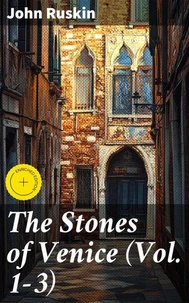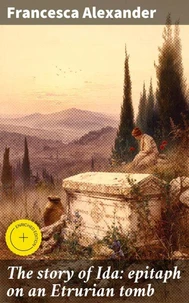The King of the Golden River; or, the Black Brothers: A Legend of Stiria
Par :Formats :
Disponible dans votre compte client Decitre ou Furet du Nord dès validation de votre commande. Le format ePub est :
- Compatible avec une lecture sur My Vivlio (smartphone, tablette, ordinateur)
- Compatible avec une lecture sur liseuses Vivlio
- Pour les liseuses autres que Vivlio, vous devez utiliser le logiciel Adobe Digital Edition. Non compatible avec la lecture sur les liseuses Kindle, Remarkable et Sony
 , qui est-ce ?
, qui est-ce ?Notre partenaire de plateforme de lecture numérique où vous retrouverez l'ensemble de vos ebooks gratuitement
Pour en savoir plus sur nos ebooks, consultez notre aide en ligne ici
- Nombre de pages36
- FormatePub
- ISBN859-65--4721047-4
- EAN8596547210474
- Date de parution04/09/2022
- Protection num.Digital Watermarking
- Taille1 Mo
- Infos supplémentairesepub
- ÉditeurDIGICAT
Résumé
In "The King of the Golden River; or, the Black Brothers: A Legend of Stiria, " John Ruskin weaves a captivating fairy tale steeped in moral allegory and rich symbolism. Written in a lyrical and ornate style, this novella presents the struggle between good and evil through the fateful encounters of three brothers over a hidden treasure. Set against an ethereal backdrop inspired by the Alpine region of Styria, Ruskin's narrative not only entertains but also serves as a critique of moral greed and the corrupting influence of wealth, embodying the Victorian ethos of social responsibility and the reverence for nature.
John Ruskin (1819-1900) was a prominent thinker, art critic, and social theorist whose passionate advocacy for beauty and moral integrity greatly influenced the cultural landscape of 19th-century England. His deep appreciation for the natural world and medieval craftsmanship profoundly informed his writing, leading him to create works that bridge art, morality, and philosophy. Inspired by his travels and his belief in the interconnectedness of humanity and nature, Ruskin crafted this tale to illuminate the consequences of avarice and the virtues of selflessness, which resonate with his broader socio-economic ideals.
I highly recommend "The King of the Golden River" for readers seeking a richly allegorical narrative that transcends mere fairy tale conventions. The story offers profound reflections on virtue, love, and the balance between humanity and nature. In this timeless legend, one discovers not only a captivating story but also a moral compass that continues to guide the discussions of ethics and responsibility in modern society.
John Ruskin (1819-1900) was a prominent thinker, art critic, and social theorist whose passionate advocacy for beauty and moral integrity greatly influenced the cultural landscape of 19th-century England. His deep appreciation for the natural world and medieval craftsmanship profoundly informed his writing, leading him to create works that bridge art, morality, and philosophy. Inspired by his travels and his belief in the interconnectedness of humanity and nature, Ruskin crafted this tale to illuminate the consequences of avarice and the virtues of selflessness, which resonate with his broader socio-economic ideals.
I highly recommend "The King of the Golden River" for readers seeking a richly allegorical narrative that transcends mere fairy tale conventions. The story offers profound reflections on virtue, love, and the balance between humanity and nature. In this timeless legend, one discovers not only a captivating story but also a moral compass that continues to guide the discussions of ethics and responsibility in modern society.
In "The King of the Golden River; or, the Black Brothers: A Legend of Stiria, " John Ruskin weaves a captivating fairy tale steeped in moral allegory and rich symbolism. Written in a lyrical and ornate style, this novella presents the struggle between good and evil through the fateful encounters of three brothers over a hidden treasure. Set against an ethereal backdrop inspired by the Alpine region of Styria, Ruskin's narrative not only entertains but also serves as a critique of moral greed and the corrupting influence of wealth, embodying the Victorian ethos of social responsibility and the reverence for nature.
John Ruskin (1819-1900) was a prominent thinker, art critic, and social theorist whose passionate advocacy for beauty and moral integrity greatly influenced the cultural landscape of 19th-century England. His deep appreciation for the natural world and medieval craftsmanship profoundly informed his writing, leading him to create works that bridge art, morality, and philosophy. Inspired by his travels and his belief in the interconnectedness of humanity and nature, Ruskin crafted this tale to illuminate the consequences of avarice and the virtues of selflessness, which resonate with his broader socio-economic ideals.
I highly recommend "The King of the Golden River" for readers seeking a richly allegorical narrative that transcends mere fairy tale conventions. The story offers profound reflections on virtue, love, and the balance between humanity and nature. In this timeless legend, one discovers not only a captivating story but also a moral compass that continues to guide the discussions of ethics and responsibility in modern society.
John Ruskin (1819-1900) was a prominent thinker, art critic, and social theorist whose passionate advocacy for beauty and moral integrity greatly influenced the cultural landscape of 19th-century England. His deep appreciation for the natural world and medieval craftsmanship profoundly informed his writing, leading him to create works that bridge art, morality, and philosophy. Inspired by his travels and his belief in the interconnectedness of humanity and nature, Ruskin crafted this tale to illuminate the consequences of avarice and the virtues of selflessness, which resonate with his broader socio-economic ideals.
I highly recommend "The King of the Golden River" for readers seeking a richly allegorical narrative that transcends mere fairy tale conventions. The story offers profound reflections on virtue, love, and the balance between humanity and nature. In this timeless legend, one discovers not only a captivating story but also a moral compass that continues to guide the discussions of ethics and responsibility in modern society.




